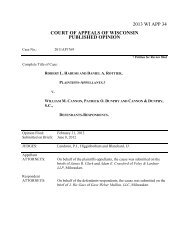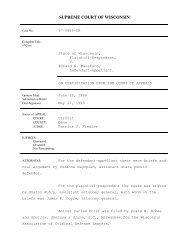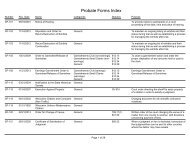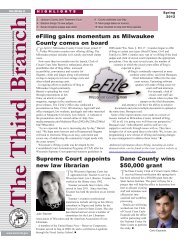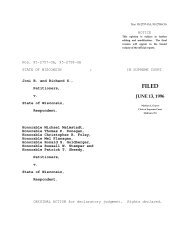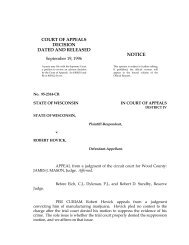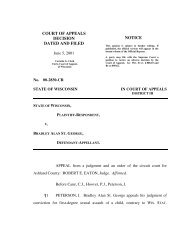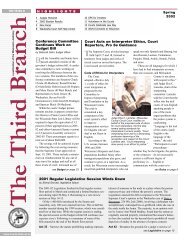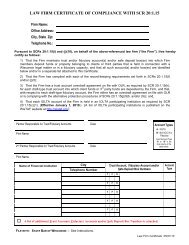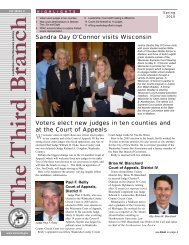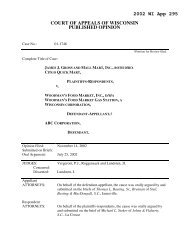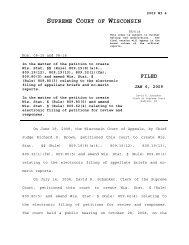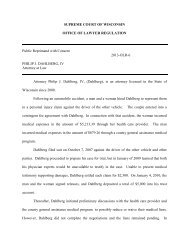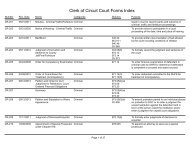Making the Record Committee - Final report - Wisconsin Court System
Making the Record Committee - Final report - Wisconsin Court System
Making the Record Committee - Final report - Wisconsin Court System
Create successful ePaper yourself
Turn your PDF publications into a flip-book with our unique Google optimized e-Paper software.
court judges. Not only do Chief Judges have this authority, <strong>the</strong>y have an affirmativeresponsibility to reassign official <strong>report</strong>ers as necessary to match resources and needs.Long-Term <strong>Making</strong> <strong>the</strong> <strong>Record</strong> Technology8. Recommend <strong>the</strong> Director of State <strong>Court</strong>s set up as soon as practicable anexploratory committee to study and plan <strong>the</strong> integration of <strong>the</strong> CCAP casemanagement system with <strong>the</strong> record making function, with a <strong>report</strong> to <strong>the</strong> Directorwithin twelve months of <strong>the</strong> first meeting. The exploratory committee shouldinclude at minimum a CCAP representative, human resources officer, court<strong>report</strong>er, judge, district court administrator and budget officer.9. Recommend CCAP begin, by <strong>the</strong> end of <strong>the</strong> 2004 calendar year, to pilot electronicrecord making equipment in two or three counties. Evaluate <strong>the</strong> results of <strong>the</strong>pilots for use by <strong>the</strong> exploratory committee and <strong>the</strong> Director of State <strong>Court</strong>s.Discussion: The committee has agreed that <strong>the</strong> future of making <strong>the</strong> record willrequire a blend of human skills and digital technology. As stated previously, <strong>the</strong>committee believes that <strong>the</strong> use of certified stenographic court <strong>report</strong>ers usingcomputer-aided transcription equipment to make, store, and transcribe <strong>the</strong> courtrecord is <strong>the</strong> option that provides <strong>the</strong> most accurate and timely record. Thiscommittee’s earlier recommendations take <strong>the</strong> first steps to introduce digitaltechnology into <strong>Wisconsin</strong>’s courtrooms by replacing <strong>the</strong> current analog recordingsystems with stand-alone digital systems, and by giving circuit court judges <strong>the</strong>choice of appointing properly certified stenographic, voice-writing, or electroniccourt <strong>report</strong>ers. The committee believes, however, that <strong>the</strong>se measures will not beenough to meet <strong>the</strong> long-term need for certified court <strong>report</strong>ers under <strong>the</strong> currentsystem. Therefore, <strong>the</strong>re is a need to explore technology-based options to serve as asupplement to (not supplantation of) <strong>the</strong> use of certified court <strong>report</strong>ers. Thecommittee believes that electronic <strong>report</strong>ing must be considered and tested and thatconsideration must be given to integration of electronic record making and <strong>the</strong> currentCCAP case management system. The pilot programs will allow for evaluation ofelectronic <strong>report</strong>ing and <strong>the</strong> feasibility of integrating it with <strong>the</strong> current casemanagement system and o<strong>the</strong>r available courtroom technology. Consideration of allfactors is essential to ensure consistent and standardized system-wide record use,storage and retrieval capabilities, and to maximize any technological benefits.An exploratory committee, coupled with a CCAP pilot, is needed now to fur<strong>the</strong>rstudy <strong>the</strong> variety of issues – technological, staffing and funding – surrounding a15



